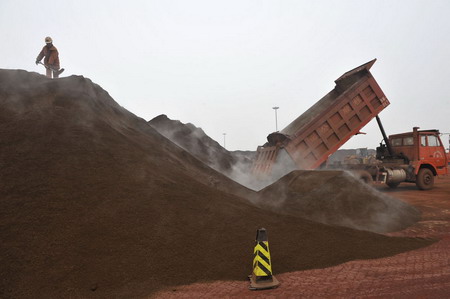|
 |
|
Imported iron ore being unloaded at Tianjin Port on Friday.[China Daily]
|
Eight government departments led by the Ministry of Commerce will jointly investigate the quality of imported iron ore stored at major Chinese ports, according to a source familiar with the matter.
Chinese steel mills and iron ore traders had recently told the government that some of the imported ore was adulterated and urged more regulation of the iron ore market, amid soaring prices and surging domestic demand, the source said.
The eight departments include the Ministry of Commerce, the National Development and Reform Commission, the Ministry of Industry and Information Technology and the Ministry of Transport.
The other agencies are the General Administration of Quality Supervision, Inspection and Quarantine, the General Administration of the Customs, China Iron and Steel Association (CISA) and China Chamber of Commerce of Metals, Minerals & Chemicals Importers & Exporters, said the source.
However, the source did not clarify the origins of the iron ore being investigated.
The investigation comes as the 2010-11 iron ore negotiations are expected to reach a consensus on the benchmark price by April 1. It is also against the backdrop of the ongoing investigation against four Rio Tinto employees who are being probed for bribery.
Xu Xiangchun, chief analyst of consulting company Mysteel.com, said steel mills should ask for compensation if the investigation proves that the imported iron ore is of low quality.
Spot prices of 62 percent iron ore rose to over $130 per ton including freight after the Spring Festival, more than double the benchmark prices set in 2009, spurred by the surging demand.
China is expected to increase steel supplies by 8.6 percent this year to 621.5 million tons, according to a report from Mysteel. The nation's $586 billion stimulus spending has significantly boosted steel demand especially from automobile makers, home-appliance manufacturers and builders.
Customs figures show China imported 630 million tons of iron ore in 2009, up 41.6 percent from 2008, mainly from Australia and Brazil.
The steel lobby, CISA, has for long wanted to regulate iron ore imports to stabilize prices.
Luo Bingsheng, vice-president of CISA, said last month that reducing the number of licensed importers and promoting the agent system at a unified price for iron ore would be the primary targets for CISA this year.
Luo said China must strive for a unified iron ore price for all imports to regulate the market, and erase the differences between long-term and spot prices.
Meanwhile, Rio Tinto said on Tuesday its massive iron ore joint venture with rival BHP Billiton will likely be delayed due to regulatory constraints.
|

